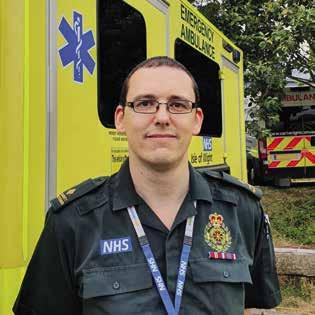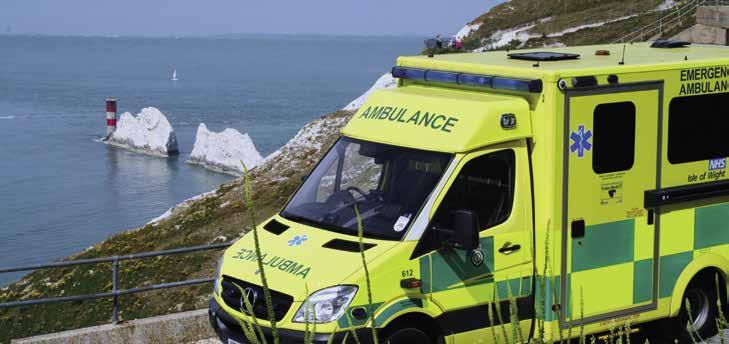
4 minute read
College of Paramedics: NHS

NHS Ambulance Services’ Best Kept Secret
Advertisement
By Mark Mearns MCPara, Specialist Paramedic, Urgent & Emergency Care, Isle of Wight Ambulance Service.
When most of us think about NHS ambulance services in England, we naturally think of the 10 remaining Ambulance Trusts established in 2006. In most cases, England’s coastal islands are the responsibility of the nearest mainland trust, however, the Isle of Wight stands out as the only NHS ambulance service in the country that is part of a wider NHS Trust. Located just off the south coast of England, the Isle of Wight is England’s largest island with an area of 147 square miles. Popularised as a holiday destination by Queen Victoria, the Island’s population of just over 140,000 swells to around 250,000 at peak times during the summer.

Isle of Wight NHS Trust provides all NHS services to the Island’s community and visitors and is unique in being the only integrated NHS Trust in the country that is responsible for acute, community, mental health, and ambulance services together. It would be easy to assume that a small island’s ambulance service might be a little behind the rest of the country but this couldn’t be further from the truth; this selfcontained ecosystem creates a wide variety of opportunities such as our pioneering sepsis care that simply cannot exist in a large Ambulance Trust. Our close-knit frontline ambulance service is made up of just 104 staff and responds to around 24,000 emergency calls each year. The family feel where everybody knows everybody is in stark contrast to mainland Ambulance Trusts and new faces always receive a warm welcome. It’s no surprise then that the Isle of Wight Ambulance Service had the best national scores in seven out of the nine elements measured in the 2021 NHS Staff Survey.
The Island is served by St. Mary’s Hospital in Newport, a 245bed facility that includes major services such as an emergency department, intensive care unit, maternity department and special care baby unit. In June 2022, our average hospital handover time for all conveyed cases was just 12.5 minutes making St. Mary’s Emergency Department one of the best performing nationally.
Having our own Emergency Operations Centre on the hospital site complete with dual-trained 111 and 999 call handlers means that we can process all of the Island’s emergency calls in one place. Clinicians of all grades are supported by both our Clinical Support Desk and the recently established Specialist Paramedic Desk.
Like everywhere else in the country, interfacility transfers take place in order for patients to receive care at specialist centres, but the body of water between the hospitals makes this a little less straightforward. The Island’s Patient Transport Service conveys routine transfers where safe to do so, and most days, a paramedic crew will transfer more acute patients by ferry in emergency ambulances. In cases of acute myocardial infarction (AMI) the Island does not have access to primary percutaneous coronary intervention (pPCI) so direct referral is made to Queen Alexandra Hospital in Portsmouth. Patients suffering AMI are conveyed by road to Ryde where they then travel to Southsea by hovercraft in a 10-minute journey with the initial responding paramedic crew escorting them. The patient’s onward journey is then facilitated by South Central Ambulance Service. Should the hovercraft not be available, HEMS will usually undertake the transfer either from scene or rendezvous with the crew at St. Mary’s. If neither are available, pre-hospital thrombolysis is delivered on scene with later transfer to pPCI. Since 2013, frontline ambulance crews have delivered prehospital IV antibiotics to patients with signs of sepsis after taking blood cultures for laboratory analysis on scene. Whilst this may seem like an easy intervention that could be provided by any ambulance service, different receiving hospitals are The Isle of Wight Ambulance Service also operates two specialist paramedic services. Our urgent care service is focused on lower acuity 999 calls that can be managed in the community with the extended skillset of the Specialist Paramedics while also undertaking out of hours GP visits, managing end of life care in the community, and carrying out advanced wound care. The team comprises of experienced paramedics who are undertaking their full MSc in Advanced Clinical Practice funded by the Trust, with those who are not yet independent prescribers supplying a wide range of medicines under patient group directions including analgesia, antibiotics, and end of life anticipatory medicines. Our newly-created critical care service is also staffed by experienced paramedics who are continually extending their scope of practice. Working closely with the service medical lead who is both an emergency department consultant and HEMS doctor, the team offers senior clinical support and enhanced care in serious medical and trauma cases across the Island, again with a wide range of patient group directions to support their practice.
I’m sure you’ll agree that there is a lot more to Britain’s smallest NHS ambulance service than you might expect, and that’s without mentioning our NQP programme, major incident exercises involving hovercrafts and helicopters, hospice work, and the many other interesting facets that come with working in an isolated island community.










